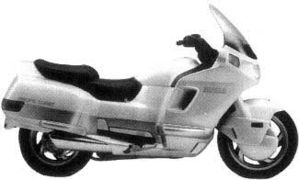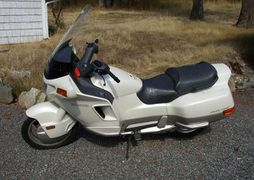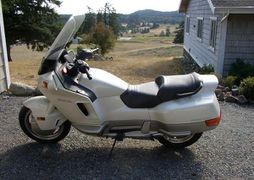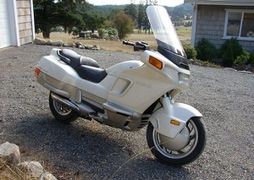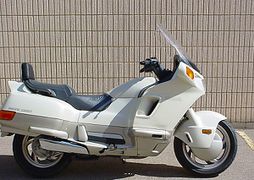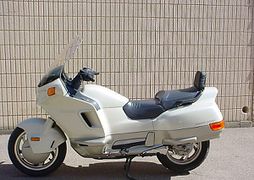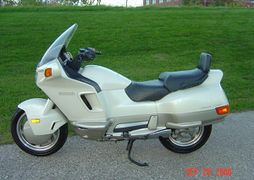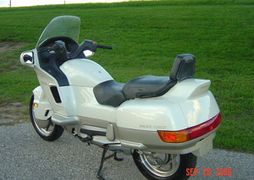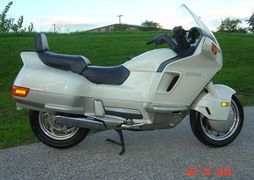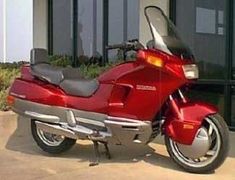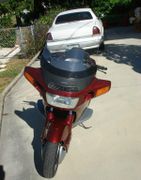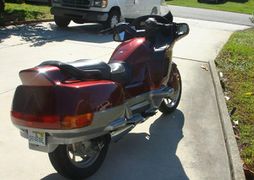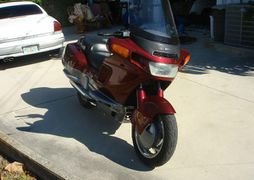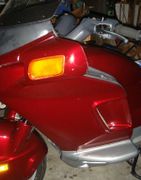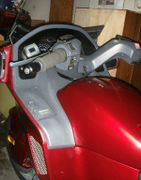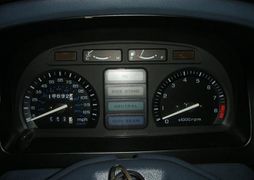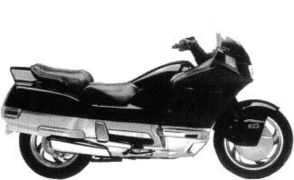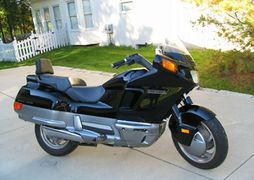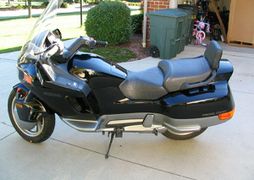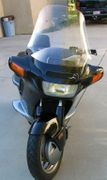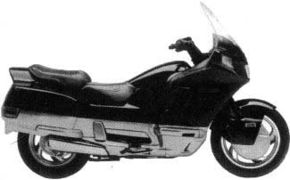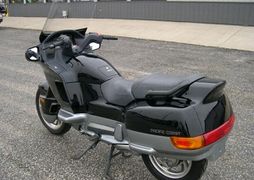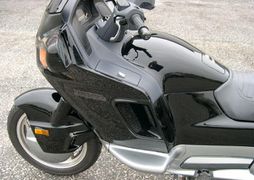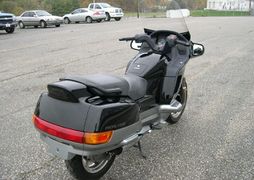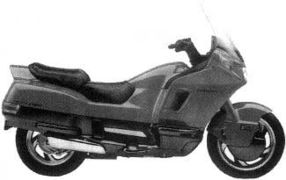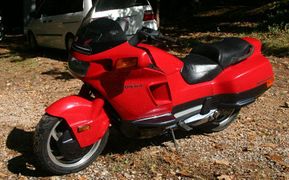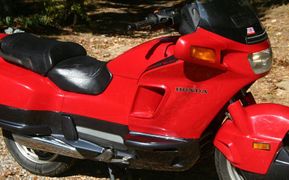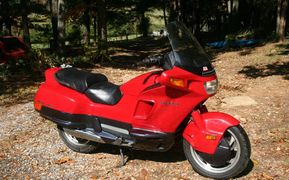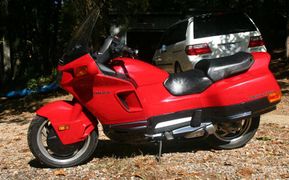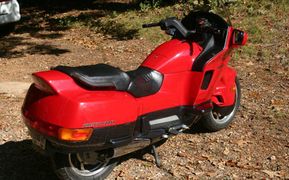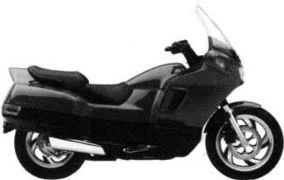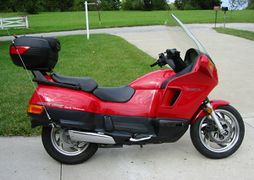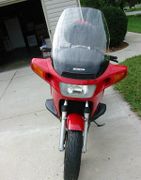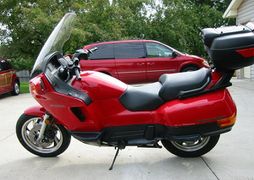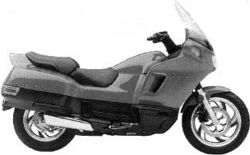Honda PC800 Pacific Coast: history, specs, pictures
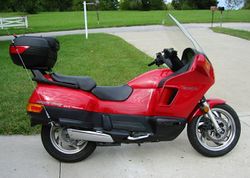 |
|
| Honda PC800 | |
| Manufacturer | |
|---|---|
| Also called | PC800 Pacific Coast, |
| Production | 1989 - 1999 |
| Class | Touring |
| Engine | v2, four-stroke |
| Bore / Stroke | 79.5mm x 80.6mm |
| Compression ratio | 9:1 |
| Top Speed | 107 mph (172 km/h) |
| Horsepower | 55.79 HP (41.6 KW) @ 6500RPM |
| Torque | 48.46 ft/lbs (65.7 Nm) @ 5500RPM |
| Fuel System | carburetor. two 34.2mm keihin cv |
| Air Filter | K&N HA-8089 `89-98[1] |
| Ignition | solid-state digital, dual spark plugs per cylinder |
| Spark Plug | NGK DPR7EA-9 '89-99 |
| Battery | YUASA YTX12-BS '89-99 |
| Transmission | Gear box: 5-speed Final Drive: shaft drive (cardan) |
| Final Drive | Shaft |
| Suspension | Front: 41mm Rear: dual shocks with four-way spring. preload adjust-ability |
| Brakes | Front: double disc Rear: expanding brake (drum brake) |
| Front Tire | 120/80-17 |
| Rear Tire | 140/80-15 |
| Wheelbase | 61.18 inches (1554 mm) |
| Length | 84.8 inches (2154 mm) |
| Width | 30.71 inches (780 mm) |
| Seat Height | 30.0 inches (762 mm) |
| Weight | 600.98 pounds (272.6 Kg) (dry), 286.2 kg (wet) |
| Oil Filter | K&N KN-303[1] |
| Recommended Oil | Honda GN4 10W-40 |
| Fuel Capacity | 4.2 Gallon (15.89 Liters) |
| Fuel Consumption | 4.70 liters/100 km (21.3 km/l or 50.05 mpg) |
| Manuals | Service Manual |
The Honda PC800 Pacific Coast was a v2, four-stroke Touring motorcycle produced by Honda between 1989 and 1998. It could reach a top speed of 107 mph (172 km/h). Max torque was 48.46 ft/lbs (65.7 Nm) @ 5500 RPM. Claimed horsepower was 55.79 HP (41.6 KW) @ 6500 RPM.
Engine[edit | edit source]
The engine was a liquid cooled v2, four-stroke. A 79.5mm bore x 80.6mm stroke result in a displacement of just 798.0 cubic centimeters. Fuel was supplied via a single overhead cams (sohc).
Drive[edit | edit source]
The bike has a 5-speed transmission. Power was moderated via the hydraulicly actuated, multi-plate, wet clutch.
Chassis[edit | edit source]
It came with a 120/80-17 front tire and a 140/80-16or15 rear tire. Stopping was achieved via double disc in the front and a expanding brake (drum brake) in the rear. The front suspension was a 41mm while the rear was equipped with a dual shocks with four-way spring. preload adjustability. The PC800 Pacific Coast was fitted with a 4.2 Gallon (15.89 Liters) fuel tank. The bike weighed just 600.98 pounds (272.6 Kg). The wheelbase was 61.18 inches (1554 mm) long.
History[edit | edit source]
In the past half decade, the touring motorcyclists' love affair with Honda's Gold Wing-and Silver Wing models has reached a high undreamed of in the past. The Gold Wing has come to symbolize a whole world of motorcycling, touring, and in fact, lifestyle. Little wonder then, that Honda would try to capitalize on its success by creating a modern sport-touring takeoff on the Gold Wing. Enter the Pacific Coast.
Touring From Coast to Coast[edit | edit source]
The most striking feature of the Pacific Coast was its flowing, full-enclosure bodywork that was designed to appeal to two different market sectors. On one hand, the bodywork covered all mechanicals, telling the new rider that here was a trustworthy motorcycle that never required you to get dirt under your Fingernails. On the other hand, the Faired body told tried-and-true riders that this was a sporting tourer -in the style of Honda's CBR1000 and CBR600 Hurricanes.
A Motorcycle Love Affair[edit | edit source]
Launched in 1988, the PC800, as it was coded, found a market but it was never as large as Honda had wished for. The 800cc engine was seen as too small for serious touring, although no one complained about the shaft drive and rear seat that tilted forward to reveal a hidden luggage compartment like the trunk of a car. Like licorice, those who liked their Pacific Coast, truly loved them.
1989[edit | edit source]
The PC800'89 was sold in 1989 and was available in one color scheme: Pearl Pacific White with Ocean Gray Metallic. It featured an underseat storage compartment. The engine was a 800cc SOHC 3-valve liquid-cooled V-twin linked to a 5-speed transmission and shaft drive. The serial number began JH2RC340*KM000015.
1990[edit | edit source]
The PC800'90 was sold in 1990 and was available in one color scheme: Candy Glory Red with Griffin Gray Metallic. This year the whindshield was taller. The serial number began JH2RC340*LM100001.
1994[edit | edit source]
- Engine: liquid cooled 45 degree V-twin
- Bore x stroke: 79.5mm x 80.6mm
- Displacement: 800cc
- Carburetion: Two 46mm diaphragm-type CV
- Transmission: Five speed, shaft drive
- Wheelbase: 61.2 inches (1554.5mm)
- Seat height: 30.1 inches (764.5mm)
- Fuel capacity: 4.2 gallons (15.9L)
- Claimed dry weight: 584.2 lbs (218.0kg)
- Measured wet weight: 640.0 lbs (238.8kg)
- Honda Service Manual Included
The PC800'94 was sold in 1994 and was available in one color: Black-Z. The serial number began JH2RC340*RM200010.
1995[edit | edit source]
The PC800'95 was sold in 1995 and was available in one color: Black-Z. The serial number began JH2RC340*SM300001.
1996[edit | edit source]
The PC800'96 was sold in 1996 and was available in one color: Magna Red. The serial number began JH2RC340*TM400001.
1997[edit | edit source]
The PC800'97 was sold in 1997 and was available in one color scheme: Magna Red with Ostrich Black. The front disc cover was deleted. A push to cancel turn signal control replaced the self-cancelling system. The serial number began JH2RC340*VM500001.
1998[edit | edit source]
The PC800'98 was sold in 1998 and was available in one color: Magna Red. The serial number began JH2RC340*WM600001.
In Media[edit | edit source]
- Totenengel - Van Leeuwens zweiter Fall
- The Race
- Marsh Turetskogo 3
- Stardom
- Joséphine, ange gardien
- Ma femme... s'appelle Maurice
- Enfants de salaud
- Harley Davidson and the Marlboro Man
- Beur blanc rouge
References[edit | edit source]
- ↑ 1.0 1.1 2019 K&L Supply Co Catalog. K&L Supply Co. 2019.
| Motorcycles: CB series | CBF series | CM/CMX series | CX Series | CBR series | NSR series | CR series | Pacific Coast | XR/XL series | Bros/HawkGT | VF/VFR series | VT series | VTX series | ST series | Valkyrie series | GL series| NR series |
| Mopeds and light motorcycles: Ape models | Cub series | CT series | ST series/Dax | S series |Wave series | Z series |
